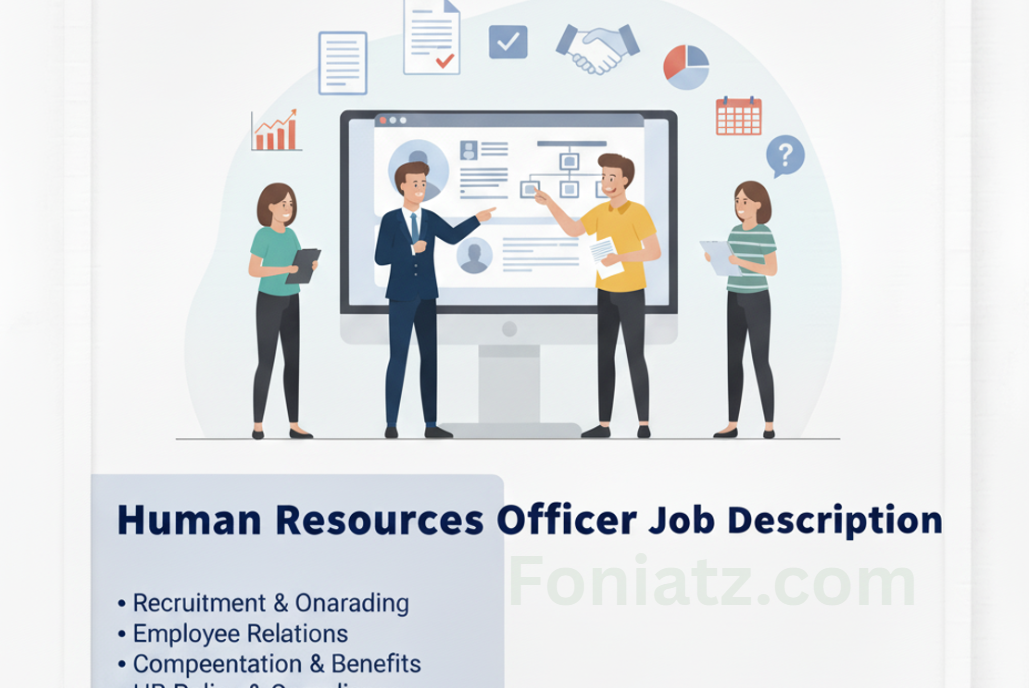Human Resources Officer Job Description: Tasks, Requirements
Hello, amazing readers! We’re delighted you’ve joined us again at Foniatz.com, your trusted source for expert career advice in Tanzania. As our businesses and organizations grow, roles such as Human Resources Officer are more crucial than ever for maintaining strong teams and fostering positive workplaces. If you’re considering this career or hiring someone for it, this article provides an overview of the job description, primary tasks, and essential requirements for an HR Officer in Tanzania. We’ll keep things simple and practical, based on what employers are looking for in 2025. Let’s explore how you can make a real difference in people’s work lives!
What Does a Human Resources Officer Do in Tanzania?
A Human Resources Officer in Tanzania supports companies by handling all aspects related to employees, from hiring to providing daily support. In places like Dar es Salaam or Arusha, where industries such as tourism, manufacturing, and NGOs are expanding, HR Officers ensure smooth operations while adhering to local regulations. They help build happy teams, resolve issues, and align staff with business goals, often working in private firms, government offices, or international groups.
This role is all about people, ensuring everyone feels valued and the company runs smoothly. It’s ideal if you enjoy organizing, communicating, and helping others advance in their careers.
Key Tasks of a Human Resources Officer
HR Officers in Tanzania undertake a range of daily responsibilities to ensure smooth operations. From job postings we’ve seen, here’s what a typical role involves:
- Recruitment and Onboarding: Post job ads, screen resumes, conduct interviews, and hire the right people. Once hired, guide new staff through orientation to help them settle in quickly.
- Employee Relations: Handle concerns, such as workplace conflicts or performance reviews. You might mediate issues or organize team-building to boost morale.
- Training and Development: Plan workshops or sessions to build skills, such as computer training or leadership programs, often tailored to local needs like Tanzanian labor laws.
- Payroll and Benefits: Manage salaries, bonuses, and perks like health insurance. Work with finance to ensure timely payments and track leaves or attendance.
- Compliance and Policies: Stay up-to-date with Tanzania’s labor laws, as outlined by the Ministry of Labour, to avoid potential issues. Update HR policies and handle contracts and terminations reasonably.
- Record-Keeping and Reporting: Maintain employee files, track key metrics such as turnover rates, and prepare reports for managers. Use tools like HR software for accuracy.
In smaller companies, you might do a bit of everything, while larger ones let you specialize. Entry-level tasks focus on admin, but with experience, you’ll lead bigger initiatives.
Requirements and Qualifications Needed
Tanzanian employers seek HR Officers who are qualified and prepared to tackle real-world challenges. Based on current job ads, here’s what you typically need:
- Education: A bachelor’s degree in Human Resources Management, Business Administration, Public Administration, or a related field from universities like the University of Dar es Salaam or the Open University of Tanzania. A diploma can be a good starting point, and a postgraduate degree is beneficial for advanced roles.
- Experience: At least 2-4 years in HR, with some postings asking for 4-5 years. Fresh graduates can start by taking internships in firms or NGOs to build their skills.
- Key Skills: Strong knowledge of Tanzanian labor laws, good communication skills for dealing with staff and bosses, and organizational skills for multitasking. Be familiar with HR tools, such as Microsoft Office or basic HR software. Soft skills like empathy and problem-solving are essential for handling people issues.
- Certifications: A plus if you have qualifications from bodies like the Tanzania Institute of Human Resource Management (TIHRM) or international ones like SHRM. Registration with relevant professional groups shows commitment.
- Other Requirements: Fluency in English and Swahili, as well as a willingness to travel or work in various regions. A clean background check is often required.
Start by gaining hands-on experience through volunteer work or entry-level admin roles to meet these standards.
Salary Expectations in Tanzania
Salaries for HR Officers depend on experience, location (higher in Dar es Salaam), and company size. From 2025 trends, including government scales and private sector data:
- Entry-Level (0-2 years): TZS 600,000 to TZS 1,000,000 per month (about $220-$360 USD), with training opportunities.
- Mid-Level (3-5 years): TZS 1,200,000 to TZS 2,000,000 per month ($430-$720 USD), often including benefits like transport allowances.
- Senior-Level (5+ years): TZS 2,500,000 to TZS 4,000,000+ per month ($900-$1,440+ USD), especially in multinationals or larger firms, plus bonuses.
The recent minimum wage increase to TZS 500,000 for public sector roles affects entry-level positions, but private jobs can offer higher salaries. Add perks like health coverage or paid leave, and remember Tanzania’s cost of living makes these amounts go further.
Opportunities and Challenges
As Tanzania’s economy continues to grow, HR jobs are emerging in sectors such as fintech, construction, and healthcare. You could work on exciting projects, like diversity programs or remote work policies. Challenges include staying updated on changing laws and managing tight budgets, but these challenges also help you grow. Join networks like TIHRM events to find chances and connect.
Thank You for Choosing Foniatz.com – We’re Here for Your Success!
We’re genuinely grateful that you stopped by Foniatz.com, the premier resource for thoughtful and reliable career advice explicitly tailored for Tanzanians. As your trusted guide to professional paths, we’re here to support you in every way. Whether you’re stepping into an HR Officer role or just starting, we wish you a fulfilling journey full of positive impact. Revisit us soon for more articles, and share your experiences in the comments.
Best wishes from our supportive team!




